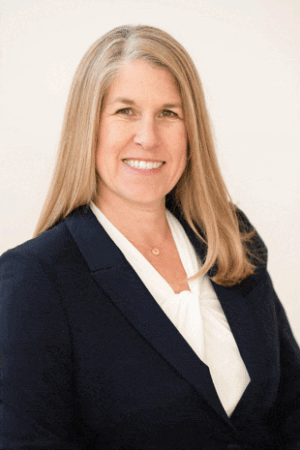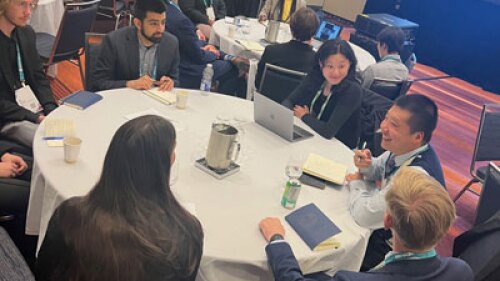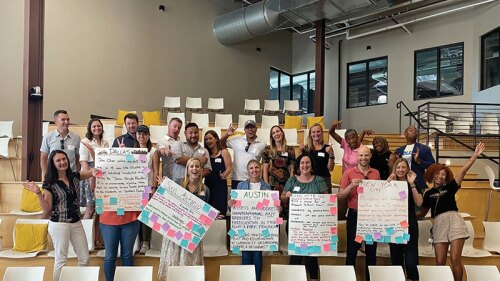In December, Gwyneth Jones Cote, an accomplished leader in the multifamily industry, joined ULI headquarters in Washington, D.C., as the president of the Americas region, the role formerly known as chief executive officer, Americas.
ULI Global Chief Executive Officer W. Edward Walter said Cote “has an extraordinary skill set that makes her perfectly suited for this role: expertise in managing complex organizations with large teams and business units, and the ability to quickly and precisely identify what must be accomplished to deliver high value to constituents.”
Cote began her real estate career in 1989, joining the Mid-Atlantic division of Trammell Crow Residential (TCR) after receiving her MBA from the Wharton School. She remained on the property operations side of TCR as it evolved into Avalon Properties and AvalonBay Communities, ultimately rising to a senior vice president position responsible for 19,000 apartment units located east of the Mississippi.
After a brief break to focus on raising her children, she consulted for several companies before joining Bell Partners in 2013 as its chief operating officer, responsible for a team of more than 1,400 employees and about 60,000 units. She stepped down from that role at the end of 2017.
“Gwyneth has a thorough understanding of ULI as a member-driven organization,” Walter said. “She will work closely with the Americas Executive Committee, our global leadership, and staff to ensure that ULI delivers an optimal member experience in the Americas region through the implementation of our Strategic Plan. She will also make certain that ULI’s work in the Americas aligns with that in the Europe and Asia Pacific regions.”
Congratulations on your new position. I understand you are relocating from Greensboro, North Carolina. Why did you choose to come to ULI to lead the Americas team?
Thank you. Well, there are a couple of things. I’d been retired for about a year and I knew there would be a “next” for me, but I really didn’t know what that next would look like. I got a phone call from [executive search firm] Spencer Stuart, from Lynn Cherney, who heads their global real estate practice. I’ll tell you, as soon as she said “ULI,” I perked up. Those of us who’ve been in the real estate business certainly recognize the preeminence of ULI and what the organization has accomplished and where it wants to go. So that really piqued my interest. And when she said that Ed Walter had recently accepted the role as global CEO, I was certainly intrigued.
At the start of my business career, I worked for Trammell Crow Residential. Ed also worked for TCR in the same region, so I had the occasion to interact with him with some frequency. Ed was influential early in my career, and the chance to be able to collaborate with Ed again now, and working for an organization such as ULI, was very appealing.
What do you hope to achieve in this role? What are your top goals?
My biggest goal is to contribute alongside the members and my colleagues to ensure that ULI’s mission is felt across the globe. The Strategic Plan is very compelling, and it was another reason why this position became even more appealing. I wholeheartedly support the basic tenets that the Strategic Plan is trying to achieve, particularly in the Americas. I’m completely on board with the mission of the organization and the effort to make ULI be extremely relevant so we can increase our impact across the globe. Goals such as using technology to enhance our members’ experience and our ability to make an even larger difference in our communites are exciting to me.
Technology has finally come to the world of real estate, and it will enable us to do things like expand the membership and enable people to feel more connected. The more that people feel engaged and connected to anything—an organization, a person, a job—the more they want to contribute to that organization. Clearly, that engagement is the driving motivation behind the strength of ULI—42,000 members and growing. So, my initial goal will be to come in and get to know the members across the Americas as quickly and as efficiently as I can. I intend to listen, to learn, and to share the members’ expectations. I can’t wait to meet the staff members throughout the Americas—to listen and collect diverse ideas—and to join forces with them to ensure that we’re delivering what we said we’re going to deliver with regard to the Strategic Plan.
You’ve already referred to the strong focus on the Strategic Plan at ULI. It might be useful to go back and define what is the purpose of a strategic plan. Why is it so important?
A strategic plan is a compass; it’s the outline of where you are, where you’re going, and how you’re going to be measured along the way to ensure that you are achieving the objectives as outlined. A strategic plan has flexibility within; it isn’t set in stone. Ours is a four-year strategic plan. Who’s capable of predicting fully what’s going to happen, not just in the first year, but in subsequent years? The purpose of ULI’s Strategic Plan is to provide a compass, to myself, my teams, and ULI’s members, as to where the organization is going. Based on the plan, it’s clear to me that we want to continue to invest in our members. We want to grow our mission impact. We want to continue to build the platforms for leadership and knowledge sharing. And we also want to create this spirit of giving, this philanthropic culture at the Institute.
In recent years, in particular, there has been a strong emphasis on ULI being a member-driven, member-centric, member-focused organization. How do you plan to weave that into your work?
That is the guiding principle, that ULI is its members. They are the ones who make it the premier organization that it is. So, it is important for me to not just meet the members, but to leverage their expertise. Their time, their talent, and their treasure are the things that are really going to drive the Institute forward and enable us to achieve our mission. There are ways that we can go about reinforcing our member development. The critical focus needs to be on continuing—and improving—our matching of programs to the things that members have said they want.
So, we’ve enhanced the Member Directory, which allows people to find each other more easily. We now have Knowledge Finder, which allows members to access and search content, and Navigator, which offers opportunities for members to become engaged. But let’s not lose sight of the fact that ULI is unique in that it comprises all these members who make it what it is. I’ll be looking for ways to connect people—to communicate our learnings and experiences—so we can implement the strategies that support the mission.
ULI is maybe unique among organizations in the diversity of professions reflected in its membership. I don’t know if there are many organizations that have that broad a reach. How important do you think that is to the character of ULI, and does having so many different constituencies make it challenging to help lead the organization?
I think the simple answer is yes, that is a challenge, but I see the challenge as an opportunity. I think the breadth of involvement from not just different sectors, but different professional roles—lawyers and bankers and developers and architects and the money pros—I think that makes for richer content, richer conversations, and richer outcomes.
I’m excited about that. I’m looking forward to meeting with as many people as I can initially and weaving together their different interests and expectations. This will ensure we are moving forward, together, in the right direction.
I think one of the biggest challenges, always, with large, spread-out organization like we have here, is communication. Without communicating things clearly, in the absence of information, people start to make things up. So, it is incumbent upon us at ULI to continue to convey—and that’s what the Strategic Plan does—who we are and where are we going and how we get there. How do we measure our success along the way? We need to communicate that strategy over and over, being flexible when needed. That’s how you weave these different constituencies, different backgrounds, this diversity, all together into one cohesive plan.
What is the biggest challenge ahead of you in this role, or for ULI as a whole?
Ed has outlined for me some key objectives—some goals that he would like me to focus on. I have to be mindful of those goals and how they are tied to the Strategic Plan. But I also am mindful of the need for a period of listening and learning. I know that 2017 was a year when ULI leadership spent a lot of time listening to the members, and that formed the background for the Strategic Plan. Similarly, I will listen to members in the different markets throughout the Americas, understanding where people are, what they want to do, and what ULI wants to do. I need to make sure we stay focused on the mission impact. I will also travel to our district councils and meet our ULI staff and members throughout the Americas. Those meetings will provide me an opportunity to continue listening and learning while also sharing how we are doing relative to the implementation of the Strategic Plan.
Is there any message you’d like to relay to the district councils in the Americas?
I’d like to relay that I’m really excited to get to know people, to learn about their markets, their key objectives, the issues that they’re focused on. ULI’s distributed network concept, with district councils, is similar in some ways to my experience in the world of property operations—meaning that regional offices or operations, despite not being in one central location, can all work together under one strategic plan. I’m looking forward to the connectivity that I hope to have happen and the collaboration that will ensure our success.




